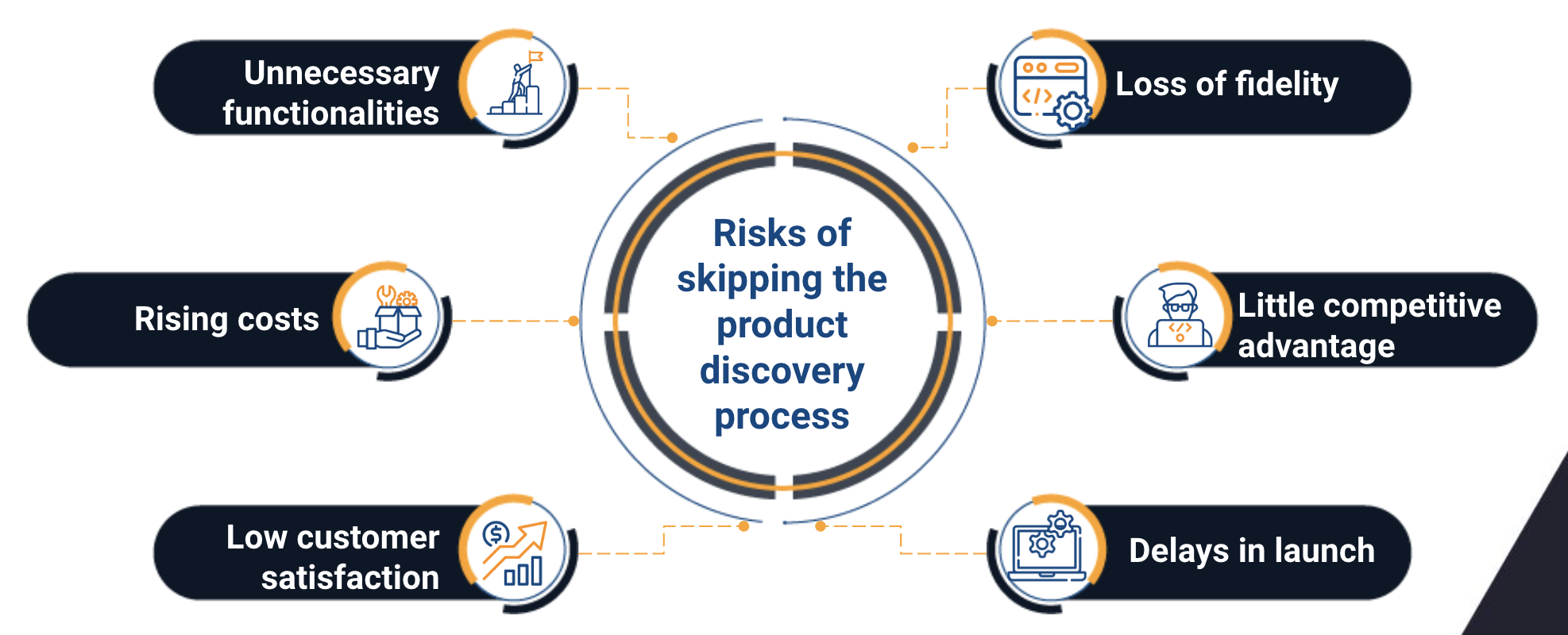
The product discovery process is a critical stage in software development, geared toward understanding customer needs, exploring opportunities, and validating solutions before beginning design and implementation. However, many companies choose to skip this phase, aiming to reduce costs or speed up development time.
We created this article to show you the main consequences of skipping product discovery, analyzing how this mistake can impact product quality, costs, customer satisfaction, and overall project success.
Consequences of skipping the product discovery process
1. Increased risk of building unnecessary features
By skipping the product discovery process, companies often make assumptions about what users need or want without having concrete validation. This lack of understanding can lead to developing features that users do not find useful, causing the product to lose value. The result is software with unnecessary features that do not meet the user's real needs.
This problem not only affects the product itself, but also development costs and time. Useless features represent a waste of resources, as the team invests time in something that will not be appreciated or used. Instead, by implementing a product discovery process, companies can prioritize key features that actually solve problems for their users, ensuring more agile and effective development.

2. Increased long-term costs
One of the reasons why some companies decide to skip product discovery is the desire to reduce costs in the short term. However, this decision tends to result in much higher costs in the future. When it is discovered too late that the product does not meet user expectations, major modifications are often necessary, which increases development time and the allocated budget.
In addition, the costs of redesigning and adjusting functionalities can increase exponentially if problems are not identified from the beginning. Instead, the product discovery process helps minimize these risks by identifying potential obstacles early on, allowing for a more accurate development plan and reducing costs throughout the product lifecycle.

3. Low customer satisfaction and loss of loyalty without product discovery
Customer satisfaction is key to the success of any product. Skipping product discovery can translate into a poor user experience, as the final product might not meet expectations or satisfy customer needs. This results in dissatisfied users, negative reviews, and a higher product abandonment rate.
A dissatisfied customer also tends to lose trust in the company, which affects their loyalty and likelihood of recommending the product to others. Lack of product discovery can seriously compromise the company's reputation, especially in a competitive environment where users are looking for products that offer them practical and effective solutions.
This process allows you to thoroughly understand the customer and develop a product that resonates with their expectations, fostering satisfaction and loyalty.
4. Difficulty in achieving a competitive advantage
In a highly competitive market, having a product that stands out from competitors is essential to attract and retain customers. Skipping product discovery means missing a valuable opportunity to innovate and create a unique product that stands out in the market. Without a detailed analysis of user needs and desires, the product runs the risk of becoming a generic option with little added value.
Product discovery allows companies to identify gaps in the market and areas where they can provide special value. This competitive advantage is especially important for startups or software companies looking to position themselves in a specific niche. By investing time in discovering opportunities and improving the product, the company has a better chance of standing out from its competitors and gaining ground in the market.

5. Delays in release time and increased development complexity
While some argue that skipping product discovery can speed up the release, the reality is often different. Without a solid foundation of understanding and validation, development tends to face problems and unforeseen events as the project progresses. This not only causes delays, but also increases the complexity of the development process.
A project that lacks proper product discovery is more likely to experience last-minute changes and extensive revisions, which impacts the workflow and can lead to confusion in the team. In contrast, effective product discovery provides a clear and well-founded roadmap, allowing the team to work in an organized manner and without significant interruptions.
Skipping the product discovery process is a decision that can bring serious consequences for any software development project. From building unnecessary functionality and increasing costs, to low customer satisfaction and loss of competitive advantage, the repercussions affect both the product and the company as a whole.
Product discovery allows you to understand the user in depth, validate ideas and minimize risks. Investing in this process not only optimizes resources, but also helps create a product aligned with the customer's real needs and with greater chances of success in the market. In an environment where users are looking for high-quality experiences, product discovery is a key tool for any company that wants to offer effective solutions and remain competitive.


